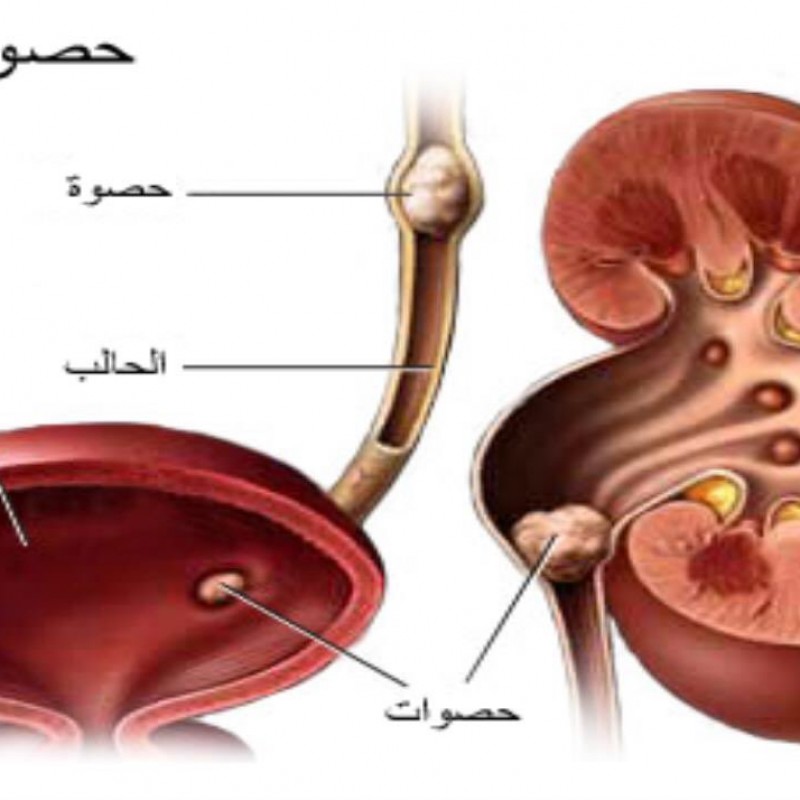The kidneys are small, but powerful, bean-like organs that perform many important functions.
They filter waste from the blood, release hormones that regulate blood pressure, balance fluids in the body, produce urine, and many other essential functions.
Kidney failure
Uncontrolled blood sugar and high blood pressure damage the kidneys' blood vessels, reducing their ability to function optimally.
When the kidneys do not function properly, waste products build up in the blood, including food waste
Therefore, it is necessary for people with kidney disease to follow a special diet.
Renal diet
For most people with kidney disease, it's important to follow a kidney-friendly diet that helps reduce the amount of waste products in the blood.
Often referred to as a kidney diet, this diet helps boost kidney function while preventing further damage.
People with kidney disease are advised to stick to the following nutrients:
1. Sodium:
It is found in many foods and is a major component of table salt. Damaged kidneys cannot filter the excess sodium, which leads to high blood levels in them. It is often recommended to limit sodium to less than 2,000 mg per day.
2. Potassium:
Potassium plays many critical roles in the body, but those with kidney disease need to limit potassium to avoid dangerously high blood levels. It is usually recommended to limit potassium to less than 2,000 mg per day.
3. Phosphorous:
Damaged kidneys cannot remove excess phosphorous, a mineral found in many foods. High levels can damage the body, so it is recommended to limit dietary phosphorous to less than 800-1000 mg per day in most patients.
4. Protein:
Another nutrient that people with kidney disease may need to limit is, as damaged kidneys cannot get rid of waste products from protein metabolism.
Those with kidney disease who are undergoing dialysis, a treatment that filters blood, have higher protein needs
Foods and drinks to avoid
1. Soft drinks
In addition to the calories and sugar that soft drinks provide, they contain additives that contain phosphorous.
While the phosphorous content varies, most dark colored soft drinks are believed to contain 50-100mg in a 200ml dose.
2. Avocado
Avocados are often promoted for their many nutritional qualities, including heart-healthy fats, fiber and antioxidants.
Individuals with kidney disease may need to avoid them because avocados are a very rich source of potassium. One cup (150 grams) of avocado provides 727 mg of potassium.
3. Canned foods
Most packaged foods contain high amounts of sodium, as salt is added as a preservative to increase their shelf life.
Due to the amount of sodium in cans, people with kidney disease are often advised to avoid or limit their consumption.
4. Whole wheat bread
It may be a more nutritious option, mostly due to its higher fiber content. However, white bread is usually recommended for individuals with kidney disease.
This is due to its phosphorous and potassium content. The more bran and whole grains in bread, the higher the phosphorous and potassium contents.
5. Brown rice
Like whole wheat bread, brown rice is a whole grain that is higher in potassium and phosphorous.
One cup of cooked brown rice contains 150 mg of phosphorous and 154 mg of potassium, while one cup of cooked white rice contains 69 mg of phosphorous and 54 mg of potassium.
6. Banana
Bananas are known for their high potassium content.
While they are naturally low in sodium, a cup of bananas provides about 806 mg of potassium.
Many other tropical fruits are also high in potassium, however, pineapple contains much less potassium.
7. Dairy
Dairy products contain high amounts of phosphorous, potassium, and protein and you should limit them in your kidney diet. Although milk is high in calcium, its phosphorous content may weaken bones in people with kidney disease.
8. Orange
While oranges are known for their vitamin C content, they are also a rich source of potassium.
One large orange (184 grams) provides 333 mg of potassium.
Given their potassium content, oranges and orange juice will likely need to be avoided or restricted in the kidneys' diet.
9. Pickles
Usually, large amounts of salt are added during the curing or pickling process.
For example, one cup of pickle can contain more than 1251 mg of sodium.
10. Apricot
Apricots are rich in vitamin C, vitamin A and fiber.
It also contains a high percentage of potassium. One cup of fresh apricots provides 401 mg of potassium
The potassium content is most concentrated in dried apricots.
One cup of dried apricots provides over 1500 mg of potassium
11. Potatoes and sweet potatoes
One medium sweet potato (156 g) contains 610 mg of potassium, while one medium sweet potato (114 g) contains 541 mg potassium.
Fortunately, potatoes and sweet potatoes can be soaked, to reduce their potassium contents.
12. Tomatoes
Tomatoes are another fruit that is high in potassium that may not fit the guidelines of the kidney diet.
It can be served raw or stewed and is often used to make sauces.
Just one cup of tomato sauce can contain over 900 mg of potassium.
13. Ready-to-cook and packaged meals
Processed foods can be a major component of sodium in the diet.
Among these foods, usually packaged, instant, and ready-to-eat meals.
Examples include frozen pizza, microwaveable meals, and instant pasta.
14. Dates, raisins and prunes
Dates, raisins and prunes are common dried fruits.
When the fruits are dry, all their nutrients, including potassium, are concentrated. Therefore, it is advised to avoid or reduce dates, raisins and prunes
15. Pastries, chips and crackers
Ready-to-eat snack foods such as pretzels, chips, and crackers tend to be low in nutrients and relatively high in salt.
Moreover, if the chips are made from potatoes, they will also contain a significant amount of potassium.

